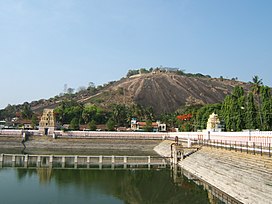Vindhyagiri Hill
| Vindhyagiri Hill | |
|---|---|
 Vindhyagiri hill from the ground | |
| Geography | |
 |
Vindyagiri is one of the two hills in Shravanabelagola in the Indian state of Karnataka. The other one being Chandragiri.
History
Vindhyagiri is first referred to as "Per kavappu" (Large - Kalbappu) in 8th Century, but its history begins with that of Gommateshwara in the Late 10th century. A century and half later the town is named Gommatapura, after the colossus, but the hill itself is not identified with a distinctive name. The present name "Vindhyagiri" is said to be derived from vim, spirit and dhya, meditation, as being the spot consecrated by rishis observed in the meditation on the supreme spirit.
Geography
The hill is located about 3,288 Feet from Mean sea Level and 438 Feet above the ground.
Importance

The colossus of Bahubali at the summit dominates the valley. Jain mythology informs us that the first colossus of Bahubali was installed by Bharata at Paudanapura, it is described to be about 525 spans (Maru - about a meter) high. The 58' 8" high Bahubali image on the Large Hill with 438' high granite mass forming its pedestal.
In 981 A.D., Chavundaraya, a Ganga minister converted a tor standing at the summit into a colossus.[1] Choosing a strategic opening between boulders, he also constructed a gateway (the present Akhanda Bagilu) with a large Gajalakshmi panel adorning its upper portion.
Odegal basadi is the largest basadi on Vindhyagiri hill.[2] The temple derives the name from 'Odega', i.e., soapstone used for strengthening the walls of the temple.[3] The temple houses image of Rishabhanatha, Neminatha and Shantinatha.[4]
See also
Notes
- ^ Sangave 2006, p. 206.
- ^ Raman 1994, p. 57.
- ^ Sangave 1981, p. 14.
- ^ Knapp 2008, p. 496.
References
- Knapp, Stephen (2008). Seeing Spiritual India. iUniverse. ISBN 9780595614523.
- Sangave, Vilas Adinath (2006) [1990]. Aspects of Jaina religion (5 ed.). Bharatiya Jnanpith. ISBN 81-263-1273-4.
- Sangave, Vilas Adinath (1981). The Sacred ʹSravaṇa-Beḷagoḷa: A Socio-religious Study. Murtidevī granthamālā. Vol. 8. Mumbai: Bhartiya Jnanpith. ISBN 9789326355599.
- Raman, Afried (1994). Bangalore - Mysore. Bangalore: Orient Blackswan. ISBN 9780863114311.
External links
